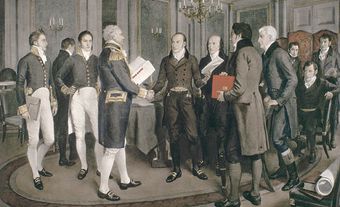
The treaty recognized Queen Anne as the legitimate sovereign of England and officially ended French support for the claims of the Jacobite party to the British throne. Territorially, it resulted in major concessions by France in North America. France agreed to restore the entire drainage basin of Hudson Bay to Britain and to compensate the Hudson's Bay Company for losses suffered during the war. In addition, France agreed to cede all claims to Newfoundland and to evacuate its base there at Plaisance (Placentia), although French fishermen retained certain rights on the Newfoundland coasts (see French Shore). Moreover, Acadia, whose capital of Port-Royal (Annapolis Royal) had been captured by a New England expedition in 1710, was to pass to Britain, although France continued in possession of a part of the territory (modern New Brunswick) because of differences of interpretation in the size of the territory. Lastly, France retained Cape Breton Island, where it began to construct the fortress of Louisbourg and Ile Saint-Jean (Prince Edward Island).

 Share on Facebook
Share on Facebook Share on X
Share on X Share by Email
Share by Email Share on Google Classroom
Share on Google Classroom


